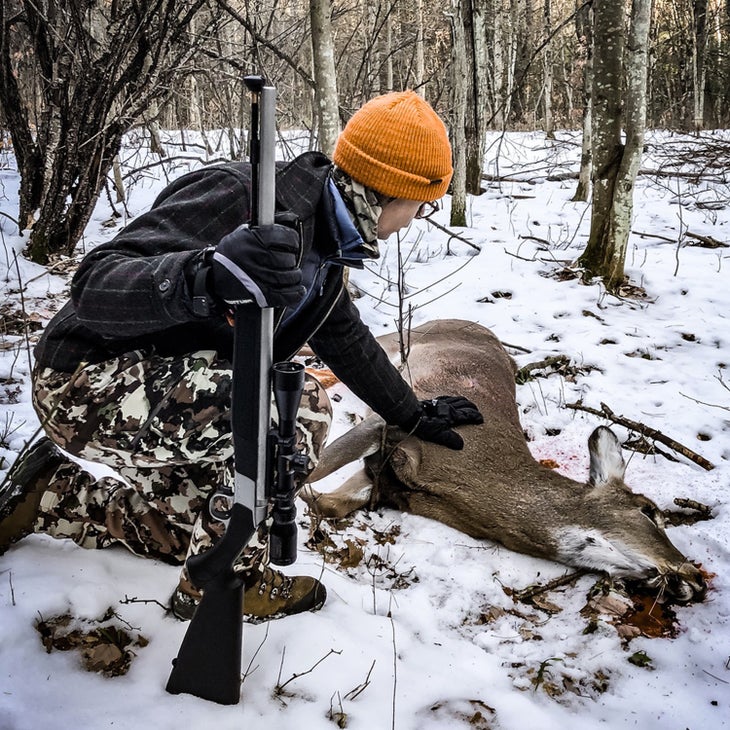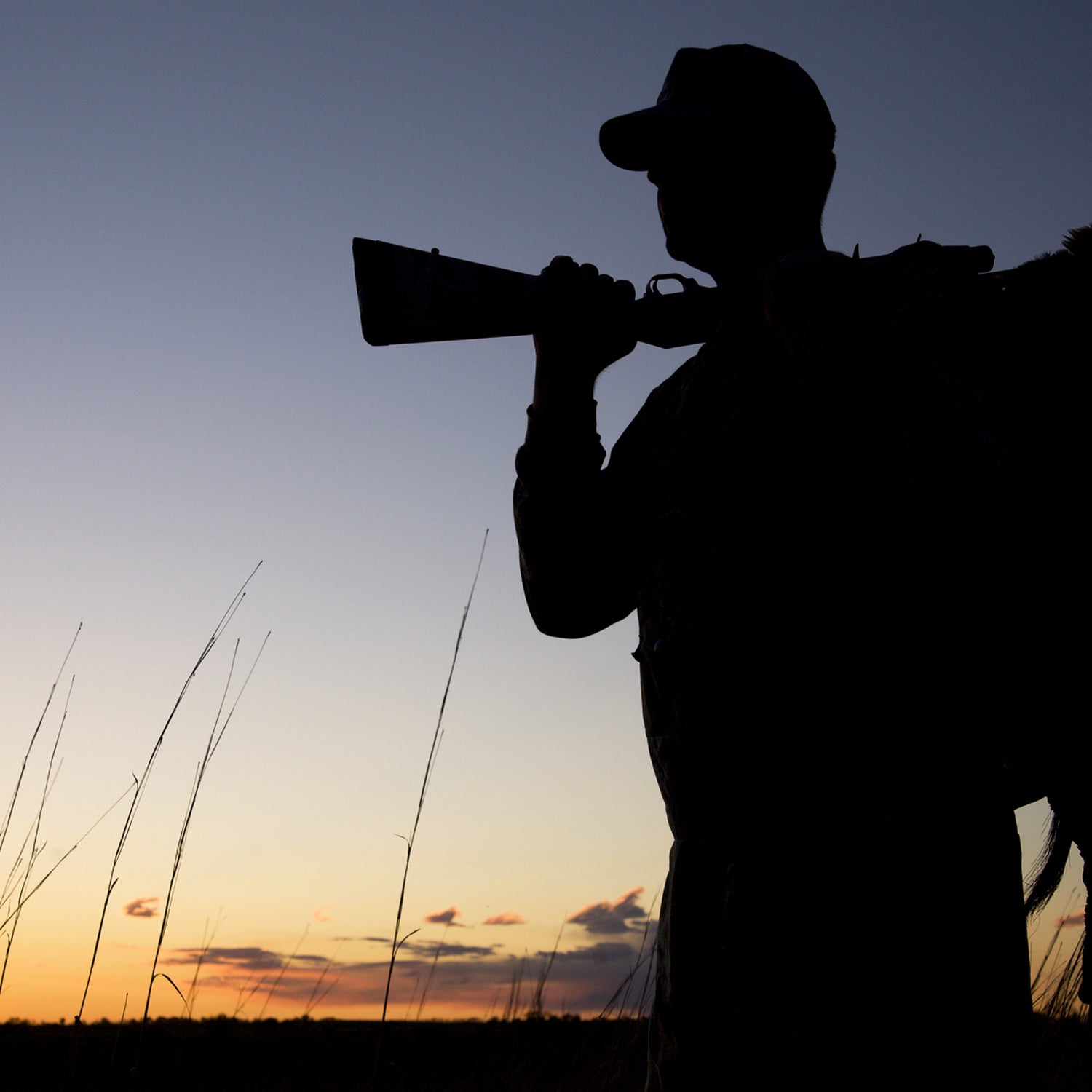ÔÇťHave you ever had to come out as a hunter?ÔÇŁ I asked.
More than 100 outdoorspeople╠řfell silent. Then╠řhands began to raise. Soon, about one-third of the╠řstaff at the Vermont Fish and╠řWildlife DepartmentÔÇÖs╠řannual retreat╠řhad acknowledged something powerful:╠řthe unsettling experience of owning an uncommon identityÔÇöin╠řthis case, that we are hunters. Although hunting remains prominent in the American imagination, the number╠řof U.S. adults with a╠řhunting license .
I have navigated coming out as both a queer man╠řand as a hunter.╠řSeeking to recognize some of the diversity that exists among hunters,╠řthe department had invited me to speak about╠řmy experiences. It, like many wildlife-management agencies across the country, is trying to welcome underrepresented identities into a tradition thatÔÇÖs slowly vanishing due to waning interest and stigma. I hoped that my story could help blaze a new path forward.
I took up hunting in earnest after moving to Vermont for graduate school╠řin 2017, at the age of 27. I had been fascinated by╠řthe activity╠řsince early childhood, when my╠řuncle served venison at a family gathering. Although I later╠řjoined him in the woods a handful of times during my early twenties, I never witnessed a deer╠řbeing╠řshot and harvested. Freshly arrived in northern New England and hoping to connect with the╠řnew landscape, my curiosity awoke╠řagain.╠řMany of VermontÔÇÖs╠řdeep forests and remote river valleys are open to hunters. From my home in Burlington, the woods╠řwere just 30 minutes away.
However, learning to hunt requires more than access to a sit spot. Like any other outdoor obsession, hunting has its own etiquette, language, and culture. Becoming a hunter would involve immersing myself in gun shops and firing ranges, acquiring and learning to use the gear needed to sit still for hours in below-freezing temperatures, and arranging for space to butcher a deer╠řif I was lucky enough to harvest╠řone. It would also require me to make a weighty personal decision: determining╠řwhen, or whether, to broach the topic of my sexuality in what is generally a socially conservative group.╠řThe risk of encountering overt homophobia felt much more likely╠řin the hunting community than╠řin my day-to-day experience as a graduate student in Burlington, a progressive college town.
But╠řVermont eased my apprehensions. Here, subcultures often regarded╠řas disparate coexist side by side.╠řThree hunting outfitters lie within a 20-minute drive of BurlingtonÔÇÖs╠řcosmopolitan downtown. Rural and urban cultures╠řblend together, more so than around the suburb of Boston where I grew up.╠řAs I began learning about hunting, support crept out of the woodwork. A╠řcolleague offered to let me hunt his land. A╠řstranger╠řhelped me through my first shots with a new black-powder gun at the shooting range: we were both zeroing in our guns at adjacent benches, when he saw that I was having trouble. We didnÔÇÖt talk much beyond exchanging╠řnames╠řbefore he got right into helping me figure out what I was doing wrong.╠řI felt welcomed as I interacted with hunters, but the simmering fear of coming out remained.
Early in my hunting career, I took pains to conceal my sexuality. I identify as queer, because I am attracted to people of all genders. Whenever I date women, I blend into╠řour predominantly heteronormative╠řsociety. But leading into my second deer season, I was dating a man.╠řI didnÔÇÖt know how that would be received by the hunting community╠řthat I was becoming a part of.╠řHunting is very social, especially when you are learning. During deer season, there are only a few weeks when you can actually be alone in the woods in pursuit of game; in╠řthe off-season, much of what makes hunting a joy are╠řthe skill-building╠řand socializing that happen╠řin support of the actual hunt.╠řA╠řnumber of hunting organizations around Vermont host╠řevents, from informal get-togethers to visiting speakers.╠řI╠řbecame acquainted with mentors, landowners, and other hunters╠řat the shooting range.╠řSooner or later, I would want to open up about my romantic life. But would it ever feel safe to do so?
On my first pheasant hunt, in October 2018, I stayed silent when the conversation turned to romantic partners. Troubleshooting my temperamental muzzleloader at the local gun shop later that fall, I said nothing while others talked about family life. I maintained a sense of personal safety through these omissions. But each time I kept my heart to myself in a community where I was otherwise starting to feel at home, a little bit of me seemed to flicker into nothing.
With my second season coming to a close, my╠řinternal tension reached a╠řfever pitch. I had just harvested my first deer, and I felt more welcome in this hunting circle╠řthan ever before. It was time to come out, I decided. But I didnÔÇÖt know how or when.
The opportunity presented itself just after deer season finished. In a small bar outside Montpelier,╠řthe smallest state capital in the country,╠řI was helping host a visiting speaker╠řat a ÔÇťpint nightÔÇŁ╠řsponsored by . I would be introducing , an advocate for women in hunting and a cofounder of the nonprofit╠ř, who╠řwas going to talk about her experience as a female hunter.╠ř(The event was part of the organizationÔÇÖs effort to seed conversations about diversity in hunting, a topic thatÔÇÖs╠řgaining traction across the U.S.)╠řSmall-town old-timers with bright plaid coats brushed shoulders with Burlington twentysomethings in sharply cut jeansÔÇöpeople from two very different versions of Vermont, brought together by a shared love for╠řthe sport. As Jess and I talked through the details of her speech over the hum of a happy crowd, I realized my introductory remarks╠řwould be a good╠řtime to put my money where my mouth was, too.
It was time to come out, I decided. But I didnÔÇÖt know how or when.
I remember the actual moment of coming out to those Vermont hunters just╠řas well as I remember pulling the trigger on my first deer: clicking the safety off, exhaling, and releasing something that could never be taken back. ÔÇťThe hunting community can seem homogenous,ÔÇŁ I said. ÔÇťBut thereÔÇÖs more diversity here than meets the eye. As a queer man and a hunterÔÇŽÔÇŁ
After I handed off the microphone, I saw a handful of downcast eyes and furrowed brows╠řbut many more smiles.
I live in a place that is perhaps uniquely open to the idea of a queer hunter. Vermont was the first state to grant same-sex couples the same benefits as straight ones, and it boasts a hunting tradition that predates its statehood. However, the safety I felt coming out in the hunting world╠řwas surely conditioned by the privilege I carry as a white, cisgendered man. American hunters are╠ř. For LGBTQ+ hunters at the intersections of multiple marginalized identities, or in states that are less welcoming to the queer community, I doubt that such friendly coming-out moments are commonÔÇöbut I hope╠řthey will become so. In the meantime, each of us who assesses their situation and feels safe enough to come out in the hunting community paves the way for others.
In the following weeks,╠řI eased into being out in a new space. I was becoming╠řmore comfortable while owning two seemingly contradictory identities,╠řat least when I was╠řamong my hunting friends.
In LGBTQ+ circles, it is common to say that people never stop coming out. Every new situation requires the same calculus. How much of myself do I want to reveal? What are the costs of voicing my experiences?
After my first successful deer hunt, that wisdom took on an unexpected new meaning:╠řI was navigating the surprisingly treacherous path of ÔÇťcoming outÔÇŁ╠řas a full-fledged hunter to friends who do not hunt.╠řThe stakes were lower, but the patterns were unmistakable.╠řI weighed╠řindividual encounters and social settings carefully, even fearfully. Sometimes I avoided talking about hunting entirely, even as it became a bigger part of my life.
I felt this new anxiety most keenly in a warm taproom in New Orleans at a New YearÔÇÖs gathering with college friends. As we took turns sharing the highlights of 2018, I knew I wanted to tell the story of my successful hunt╠řand immediately faced a stinging realization: I was certainly the only hunter in our group, and╠řnot everyone would approve that I had taken it up.╠řSome might even be offended.
I was sitting near the end of the table╠řand had time to consider my options. Relative to the danger of coming out as queer, the risk of being open about hunting was vanishingly small.╠řStill, I worried that I would alienate close friends who had strong feelings against hunting. For╠řmany people,╠řthe sport provokes╠řreactions that range from disagreement to feeling abjectly threatened. It╠řis infused with the ethics of eating meat; the injustices of race, gender, and class that shape access to public lands and wildlife; and gun control, among other serious issues. But how else could I share the nuance of╠řa hunterÔÇÖs sadness, gratitude, and sense of obligation to a place╠řother than by talking about it?
My turn arrived.╠řÔÇťThis year╠řI had my first successful deer hunt,ÔÇŁ I said.
Silence. Then╠řa bark of uneasy laughter from my friend Claudia. Anxiety boiled into my throat as I glanced down the table. Claudia would not look me in the eye.
There have been times when owning my identity as a queer man has clearly made others uncomfortable╠řor made me unwelcome in certain company. I didnÔÇÖt want to repeat that experience, and╠řI was scared to widen the gulf I had just created by saying more. But I had to voice to my experiences╠řor risk more of myself flickering into nothingness.
As the moments passed, I realized that ClaudiaÔÇÖs uncomfortable laughter had stopped. Other friends were leaning forward, smiling and curious. The acid in my throat receded, and I began to speak again.
ÔÇťI shot my deer on the last day of doe season, in a╠řhornbeam stand between the Champlain Valley and the Green MountainsÔÇŽÔÇŁ
I did not register the shot so much as the smoke that followed it. One minute, five deer had been nosing under oak leaves for acorns; the next, I had chosen one to transform into venison, to kill and to harvest. A swirling╠řgray cloud filled my vision. The crash of wild bodies in the bracken thundered in my ears.
The smoke faded and the woods became still. With shaking fingers, I texted Jess JohnsonÔÇöit was a day before the╠řpint night, and she had joined me in the field as a mentor. Jess replied immediately:╠řÔÇťWait╠ř30╠řminutes. Give your deer time to lay down and die. Give yourself time to make peace with what youÔÇÖve done.ÔÇŁ
For half an hour, the woods thrummed with a kind of sharpness that my senses╠řseemed only half able to absorb.

Then I searched for my deerÔÇÖs blood trail, and my heart leaped╠řat the sight of frothy-pink lung matter among the drops of red. My shot had been a good one. I set out in pursuit.
When I found my deer,╠řI crouched beside her╠řand felt the weight of the task ahead. Humility and delight, surprise and gravity╠řall twisted together in the prospect of turning her body into food. I knew I would be changed by the act. And with that knowledge came gratitude.


